|
|
|
Sort Order |
|
|
|
Items / Page
|
|
|
|
|
|
|
| Srl | Item |
| 1 |
ID:
127778
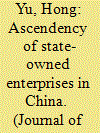

|
|
|
|
|
| Publication |
2014.
|
| Summary/Abstract |
The state sector still plays an important role in China's economy. One of the key development phenomena characterizing the Chinese economy is the rapid ascendency of state-owned enterprises (SOEs) and the resurgence of the state. The strength of China's SOEs is projected in the centrally administrated state-owned enterprises (CSOEs). They are the backbone of the national economy, spearheading national economic development and Beijing's 'going-out' strategy. The CSOEs have expanded their reach and increased their power, domestically and globally. In seeking to boost local GDP growth, the eastern provinces in China have joined the western provinces in a fierce contest to attract investment from SOEs. Nevertheless, the rapid ascendency of the SOEs has brought many negative consequences for China's economic, social and political development by causing conflict with the market-oriented development direction of Chinese economic reform and hindering fair competition between state-owned and non-state-owned enterprises.
|
|
|
|
|
|
|
|
|
|
|
|
|
|
|
|
| 2 |
ID:
124314
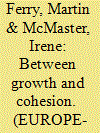

|
|
|
|
|
| Publication |
2013.
|
| Summary/Abstract |
THE ISSUE OF REGIONAL DEVELOPMENT IS HIGH ON THE POLICY agenda in Central and Eastern Europe (CEE). Indeed, for a variety of reasons, these countries are currently seen as some of the most interesting 'laboratories' for regional development in the European Union (EU) and beyond. First, from a situation in the early and mid-1990s where ?nances for regional development in these countries were very limited, there are now signi?cant levels of funding available. These ?nances ?ow predominantly from the structural funds available under EU cohesion policy, of which CEE member states are the biggest bene?ciaries in the EU. As the contribution by Ferry and McMaster notes, this brings with it opportunities to expand the scope and impact of regional development interventions. However, it also puts pressure on regional policy systems in these countries to develop structures and processes to absorb the funds, to ensure that they contribute to strategic economic growth, and to maintain a clear vision for domestic regional development.
|
|
|
|
|
|
|
|
|
|
|
|
|
|
|
|
| 3 |
ID:
131659
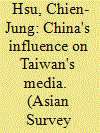

|
|
|
|
|
| Publication |
2014.
|
| Summary/Abstract |
The warming cross-Taiwan Strait relationship has allowed China greater opportunities to influence Taiwan's media. Three interrelated strategies-greater economic control over media outlets, pressure exerted on media owners, and the purchase of influential advertisements-have led to growing concerns about the erosion of press freedoms in Taiwan.
|
|
|
|
|
|
|
|
|
|
|
|
|
|
|
|
| 4 |
ID:
131459


|
|
|
|
|
| Publication |
2014.
|
| Summary/Abstract |
This article critically assesses the conflict within the Orthodox Church of Jerusalem between the Greek hierarchy and the Arab laity concerning the proposals of the Mandatory Government for a new regulatory framework for patriarchal operation. The British presented two draft reform ordinances, neither of which met Arab expectations. Instead of promoting the laity's emancipation from 'foreign' Greek administrative and financial control, the ordinances left little room for a true inversion of the power structure between the two opposing camps, retaining the status quo at the expense of the Arab Orthodox rights.
|
|
|
|
|
|
|
|
|
|
|
|
|
|
|
|
| 5 |
ID:
129572
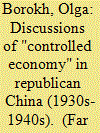

|
|
|
|
|
| Publication |
2014.
|
| Summary/Abstract |
The concept of "controlled economy" has become popular in republican China due to the study of foreign experience and the tasks put forward for a rapid development of industry with a view to strengthening the defense capability of the country. Realization of the specific features of the Chinese economy and the growing influence of liberal ideas have induced scientists to recognize the importance of market mechanisms and the need to support, mixed economy. Many aspects of economic discussions in the
1930s-1940s are close to the present arguments among modem Chinese researchers.
|
|
|
|
|
|
|
|
|
|
|
|
|
|
|
|
| 6 |
ID:
128099
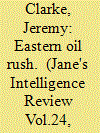

|
|
|
|
|
| Publication |
2012.
|
| Summary/Abstract |
Followign Tullow Oil's major discovery in Turkana county,Kenya has seen a surge in interest from foreign oil companies. Jeremy Clarke assesses the various security risk facing the country's nascent oil industry and the likely impact on the 2013 election.
|
|
|
|
|
|
|
|
|
|
|
|
|
|
|
|
| 7 |
ID:
126752
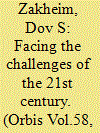

|
|
|
|
|
| Publication |
2013.
|
| Summary/Abstract |
America's strategy has become increasingly budget-driven in the face of ongoing cuts, culminating in the sequester. As a result, fewer funds are, and will be, available for critical operations, notably exercises and training with foreign forces that are the key both to strengthening alliances and partnerships and to deterring current and potential adversaries. That Washington continues to revise its defense strategy virtually on an annual basis has further undermined its credibility worldwide. Given its long-standing global interests, and uncertainty regarding when and where it might again have to commit forces to defend them, the United States must reinvigorate its efforts to streamline the Defense Department so as to maintain its global posture in the face of budget pressures. Measures to improve defense efficiency include reductions in the civilian and contractor work forces, overhaul of the military medical and retirement systems, and repeal of anachronistic laws that foster waste in defense acquisition.
|
|
|
|
|
|
|
|
|
|
|
|
|
|
|
|
| 8 |
ID:
124380
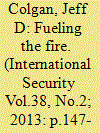

|
|
|
|
|
| Publication |
2013.
|
| Summary/Abstract |
What role does oil play in international security? While the threat of "resource wars" over possession of oil reserves is often exaggerated, the sum total of the political effects generated by the oil industry makes it a leading cause of war. Between one-quarter and one-half of interstate wars since 1973 have been connected to one or more oil-related causal mechanisms. Eight distinct mechanisms exist: resource wars, in which states try to acquire oil reserves by force; petro-aggression, whereby oil facilitates domestic political control of aggressive leaders such as Saddam Hussein or Ayatollah Ruhollah Khomeini; externalization of civil wars in petrostates; financing for insurgencies, such as Iranian oil money to Hezbollah; conflicts over potential oil-market domination, such as the United States' conflict with Iraq over Kuwait in 1991; control over transit routes, such as shipping lanes and pipelines; oil-related grievances, whereby the presence of foreign workers in petrostates helps extremist groups such as al-Qaida recruit locals; and as an obstacle to multilateral cooperation, such as when an importer curries favor with a petrostate to prevent multilateral cooperation on security issues. Understanding these mechanisms can help policymakers design grand strategy and allocate military resources
|
|
|
|
|
|
|
|
|
|
|
|
|
|
|
|
| 9 |
ID:
128087
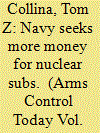

|
|
|
|
|
| Publication |
2013.
|
| Summary/Abstract |
Warning that ongoing defense spending cuts will have a "devastating impact" on its plans to build new ships, the Navy is asking Congress for an additional $60 billion over 15 years to pay for a dozen new nuclear-armed submarines. Testifying Sept. 12 before the House Armed Services Seapower Subcommittee, Rear Adm. Richard Breckenridge, the Navy's director of undersea warfare, said that the Navy's projected shipbuilding budget cannot afford to pay for the 12 new submarines, known as the SSBN(X). These new boats are to replace the existing fleet of nuclear-armed Ohio-class subs, which the Navy plans to start retiring in 2027. "Congress must look at a way to provide an annual supplement to the Navy" during the time that construction costs will peak, Breckenridge said. The Navy is seeking $4 billion per year over the 15-year period that the new subs would be built, starting in 2021. Breckenridge said that the SSBN(X) should be looked at as "a requirement above the Navy" that should be insulated from "the pressures of sequestration."
|
|
|
|
|
|
|
|
|
|
|
|
|
|
|
|
| 10 |
ID:
128069
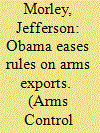

|
|
|
|
|
| Publication |
2013.
|
| Summary/Abstract |
In a little-noticed move Oct. 15, the U.S. government began to revamp its long-standing system for regulating the export of U.S.-made weapons ranging from submachine guns and night vision goggles to killer drones and fighter jets. The Export Control Reform Initiative, launched by the Obama administration in August 2009, will affect U.S. oversight of U.S. firms supplying the $83 billion global arms market. In an Oct. 15 statement, the White House said the initiative will end "the disproportionate focus on the least sensitive items such as nuts, bolts and screws instead of the most sensitive items"; encourage closer logistical collaboration with U.S. military allies and partners; and boost the U.S. defense industrial base.
|
|
|
|
|
|
|
|
|
|
|
|
|
|
|
|
| 11 |
ID:
130466
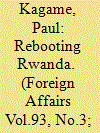

|
|
|
|
|
| Publication |
2014.
|
| Summary/Abstract |
On April 6, 1994, a plane carrying Rwandan President Juvénal Habyarimana was shot down by unidentified assailants. The next day, the killings began. Over the next three months, as the international community stood by, an estimated one million Rwandans-Tutsis and moderate Hutus-were systematically slaughtered by Hutu extremists, mostly using clubs and machetes. The genocide, one of history's worst and certainly its quickest, finally ended in July, when the Rwandan Patriotic Front seized control of the country. The rebel army was led by a 36-year-old Tutsi former refugee named Paul Kagame, who promptly took political control: serving first as the de facto leader of the country while defense minister and vice president and then, in 2000, assuming the presidency. During Kagame's two-decade rule, Rwanda has made spectacular progress. A country famously deemed "nonviable" in the mid-1990s has become one of Africa's best-run, most orderly, least corrupt, and safest states, with a booming economy (Rwanda's GDP has grown by an average of eight percent in recent years). But Rwanda's success has come with a darker side: opposition politicians have been jailed or killed under mysterious circumstances, journalists complain of harassment, and Kigali has been regularly criticized for meddling in neighboring Congo's long-running civil war. In late February, Kagame met with Foreign Affairs managing editor Jonathan Tepperman in Kigali to discuss these controversies, his tenure, Rwanda today, and the legacy of the mass killings two decades ago.
|
|
|
|
|
|
|
|
|
|
|
|
|
|
|
|
| 12 |
ID:
128098
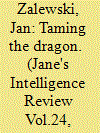

|
|
|
|
|
| Publication |
2012.
|
| Summary/Abstract |
China and Myanmar's deep strategic and economic relationship is changing. Jan Zalewski examnines how Myanmar's transition from military dictatorship to a form of semi democratic governance will affect Sino-Myanmar Relations in the future
|
|
|
|
|
|
|
|
|
|
|
|
|
|
|
|
| 13 |
ID:
128086
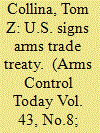

|
|
|
|
|
| Publication |
2013.
|
| Summary/Abstract |
The United States and 17 other countries signed the Arms Trade Treaty (ATT) on Sept. 25, pushing the number of signatories to the pact, which was opened for signature June 3, to 107.
Calling it a significant step toward controlling the illicit trade in conventional weapons, Secretary of State John Kerry signed the treaty on behalf of the United States, the world's largest arms exporter, in a ceremony at the United Nations. "This is about keeping weapons out of the hands of terrorists and rogue actors," Kerry said.
"It's significant that the United States, which [accounts] for about 80 percent of the world's export in arms, has signed," Australian Foreign Minister Julie Bishop told a news conference. In 2012, states engaged in arms transfers totaling more than $85 billion, not including black market transfers, according to the Congressional Research Service.
|
|
|
|
|
|
|
|
|
|
|
|
|
|
|
|
|
|
|
|
|